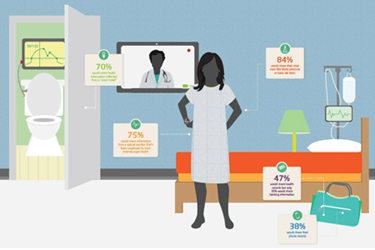Public Receptive To Mixing Health And Tech, Intel Study Finds
By Sara Jerome,
@sarmje

Despite the lingering notion that people are squeamish about the increasing digitization of their health records and doctor visits, public attitudes about the role of technology in the medical field may be improving.
Chip giant Intel recently released a study stating that "most people are optimistic about technology innovations advancing healthcare, are willing to participate in virtual healthcare visits with their doctor, and would use health sensors in their bodies and even their toilets."
The study was commissioned by Intel and conducted by the market research firm Penn Schoen Berland. Researchers surveyed a total of 12,000 people in a across eight countries.
Intel noted positive findings in the report in its announcement.
About half of the people surveyed "would trust a diagnosis delivered via video conference from their doctor," Intel said.
Seventy-two percent were "receptive to communication technologies that allow them to remotely connect to their doctor."
People are more willing "to anonymously share their health records or genetic information than their banking information or phone records."
Not all studies have found positive news about perceptions of the digitization of healthcare. Public perception appears to remain a key barrier to adoption.
For example, a study this year by health insurer Kaiser Permanente found that doctors' attitudes toward technology are a major barrier to adoption of electronic health records (EHRs).
"Implementing EHRs means a change in working styles and processes, and people often resist change. In addition, physicians may be concerned about their loss of control of patient information since the data may be shared and assessed by others," the report said.
In addition, "physicians sometimes fear that computers will disrupt their communication with patients, and this fear must be addressed," the report said.
A recent study by researchers at Isfahan University of Medical Sciences found that "despite of evidence to the contrary, [patients who do not use electronic records] believe that there are more security and confidentiality risks involved with EMRs than paper records."
Still, according to a recent Law360 report, 2013 was a good year for health technology.
"The statutory and regulatory framework, marketplace, infrastructure and use of health information technology has grown and changed exponentially during the 2013 calendar year," the report said.
In particular, the report said that the adoption and use of electronic health records has increased significantly due to public policy changes promoting such technology.
Image credit: Intel
